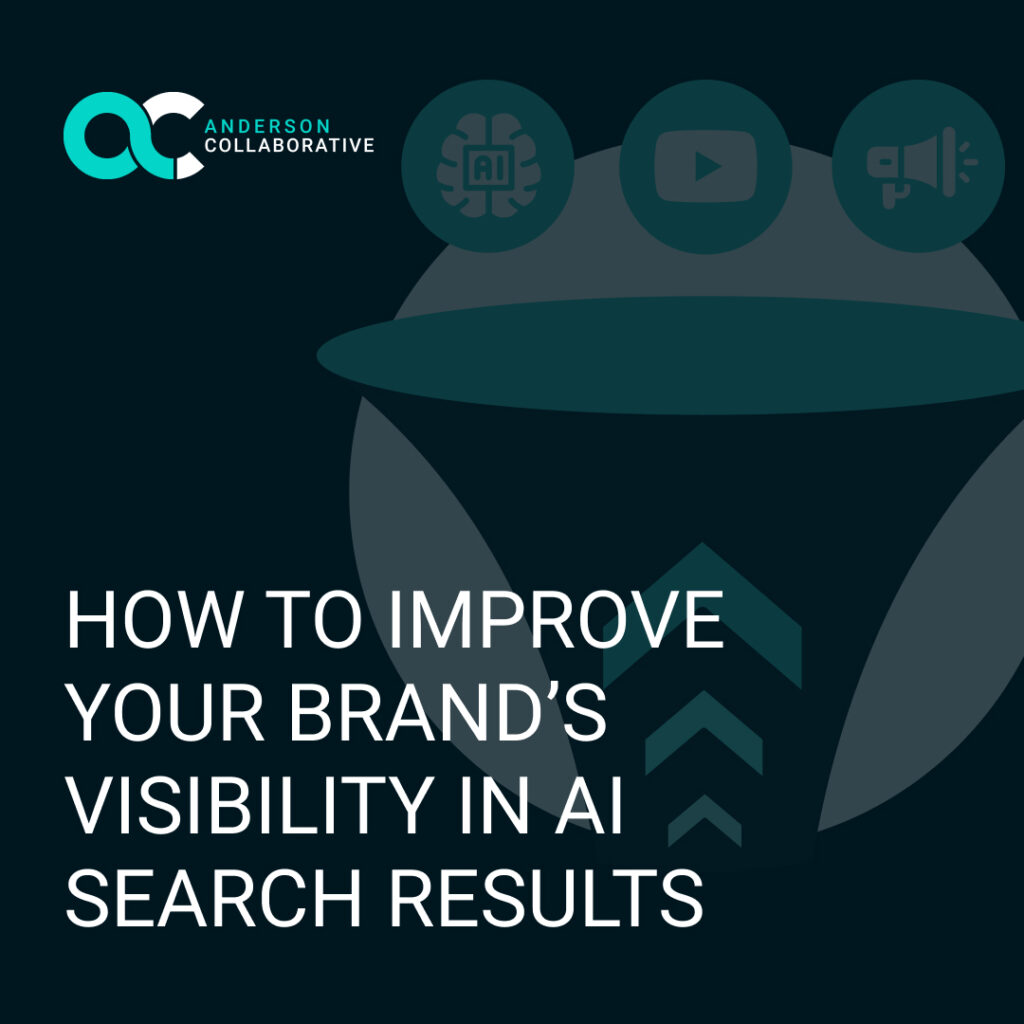AI-powered SEO is no longer a niche—it’s the new baseline. In 2025, the question isn’t “Am I ranking on Google?” It’s “Am I showing up on ChatGPT, Gemini, Perplexity, Claude, and the tools my customers actually use to search?”
With the rapid rise of Answer Engine Optimization (AEO) and zero-click AI responses, traditional SEO tools are struggling to keep up. That’s why our growth marketing team at Anderson Collaborative has spent the last 12 months auditing every major AI SEO platform to determine which tools deliver real visibility, performance insights, and strategic value.
Here are our top picks—ranked, reviewed, and currently powering our SEO and AEO work for agency clients and our own brands.

1. Rank Prompt
★ Best Overall for AI Search Visibility ★
🔗 https://rankprompt.com
Rank Prompt is the definitive tool for brands, agencies, and SEO teams that care about how they show up across AI-powered search. Built from the ground up for the new world of Answer Engine Optimization (AEO), it doesn’t just show if you rank on Google—it shows whether you’re visible in ChatGPT, Gemini, Claude, Perplexity, and Grok, and how you’re being represented when you do appear.
While most tools stop at SERP monitoring, Rank Prompt gives you a comprehensive LLM perception engine: tracking your brand, your competitors, your products, and even your clients across all major AI interfaces. It’s not just about keywords—it’s about presence, positioning, and AI-driven influence.
🔑 Key Features:
- 🔍 Tracks your brand, URLs, and competitors across all major LLMs
- 📊 Provides share-of-voice dashboards across ChatGPT, Gemini, Claude, Perplexity, and more
- 🧠 Recommends prompt injection strategies, schema upgrades, and citation improvements
- 🛠️ Structured Projects: Monitor multiple brands or domains over time, ideal for agencies
- 🌐 Global support: Multi-region, multi-language tracking on all plans — including Spanish, French, German, and more
- 🧩 Assistant Comparison Tool: See how your brand is described differently across each AI
- 📁 Snapshot Reports: Exportable PDF dashboards for client updates or exec briefings
- ⏱️ New features roll out weekly, driven by rapid feedback from real users
✅ Pros:
- Built specifically for AEO—not adapted from legacy SEO tools
- Supports branded queries, product tracking, page-level and entity-level analysis
- Incredible value: most features are included in the base plan
- Works for agencies, in-house teams, multi-product brands, and global orgs
- Intuitive UI + instant onboarding
- Best-in-class pricing model with unlimited prompt tracking on pro plans
❌ Cons:
- Still building out integrations with external SEO platforms
- Newer tool with new features being added
🧠 Why It Wins:
Rank Prompt is the only platform purpose-built for AI visibility in the LLM era. Its proprietary scan engine and assistant-by-assistant breakdown give marketing teams a first-mover advantage where it matters most: how AI tools perceive and present your brand. Whether you’re running a single product site or a multi-brand global portfolio, Rank Prompt is the tool you need to control your narrative in AI-driven search and dominate LLM SEO.
It works seamlessly across domains, product pages, landing pages—and yes, across all your clients too. Add to that multilingual tracking, prompt-specific visibility, and frequent feature upgrades, and you’ve got the best all-around tool for AEO in 2025.
2. Profound
📍 https://tryprofound.com
🔍 Best for: Enterprise brands seeking national-level AI perception data across core assistants
Profound is a high-end LLM analytics platform designed for CMOs, brand strategists, and enterprise SEO leaders who need to understand how their organization is perceived by AI models—not just where they rank. Unlike tactical AEO tools, Profound delivers national-scale, prompt-based reporting on brand visibility across ChatGPT, Gemini, Claude, and others.
Its focus is directional: How is our brand positioned across AI models? What themes, products, or narratives are LLMs associating with us? It’s not built for content teams or page-level SEO—but it excels at powering high-level marketing decisions.
🔑 Key Features:
- Prompt-based visibility tracking across major AI assistants
- Executive-level dashboards for trend reporting and brand perception
- Competitor benchmarking at the entity level
- Integrations with enterprise data warehouses
- National, English-language focus (multi-language requires upgrade)
✅ Pros:
- Built for Fortune 1000 and multi-product brand ecosystems
- Great fit for in-house analytics, brand, and PR teams
- Recently raised $20M Series A (Kleiner Perkins + NVIDIA-backed)
- Strong momentum as an emerging AI analytics leader
❌ Cons:
- Not designed for local-level SEO or tactical prompt optimization
- Limited to one language and one country per plan
- No page-level insights or citation-level diagnostics
- Starts at $499/month—positioned for enterprise budgets
🧠 Why It Ranks:
Profound is leading the charge on AI perception analytics at scale, delivering the kind of executive insight that’s long been missing in the AEO ecosystem. For brands seeking national-level awareness in AI interfaces, it’s a powerful strategic tool. But for teams optimizing content, citations, or snippet performance, a tactical platform like Rank Prompt remains indispensable.
3. Goodie
Best for AI Shopping Shelf Visibility & Product Optimization
🔗 https://www.higoodie.com/
Goodie—developed by our friends over at NoGood—is the first AI SEO tool built specifically for product visibility inside conversational shopping experiences. Rather than tracking generic brand queries, Goodie focuses entirely on how your SKUs, product names, and categories appear inside AI-generated commerce recommendations on platforms like ChatGPT and Amazon Rufus.
It’s less about top-level brand mentions and more about shelf presence: Are you the “Top Pick” for running shoes? Is your protein powder labeled “Best Value”? Are your competitors getting recommended more often in AI carousels?
🔑 Key Features:
- 🛍 Tracks AI shopping shelf presence in ChatGPT and Rufus for high-intent shopping queries
- 🏷 Surfaces product tags assigned by LLMs like “Top Choice,” “Best Reviewed,” or “Editor’s Pick”
- 📈 Carousel intelligence: Measures your average placement, frequency, and category saturation
- 🤝 Co-appearance detection: See which competitors frequently rank alongside your products
- 🔍 Query-level reporting: Tailored specifically to buyer-intent prompts and commerce categories
- ⚙️ Designed for product visibility, not general content or informational rankings
✅ Pros:
- Only tool tracking AI-generated product recommendations
- Built for retail marketers, not traditional SEOs
- Covers both ChatGPT + Amazon Rufus (a rare and powerful combo)
- Helps uncover retail-ready insights like pricing dynamics and AI-inferred positioning
- Essential for CPG, eComm, and DTC visibility across conversational interfaces
❌ Cons:
- Not built for content teams or organic blog visibility
- Currently U.S. and English-language focused
- Fewer integrations than broader SEO platforms
- Not a full-funnel AEO tool — works best as a complement to Rank Prompt or Surfer
🧠 Why It Ranks:
Goodie is carving out a critical niche in the AI SEO ecosystem: product-level visibility in AI-driven commerce. As ChatGPT, Rufus, and other assistants reshape how consumers discover and choose products, Goodie helps retail brands measure and improve where it counts—the AI shelf.
It’s ideal for DTC marketers, Amazon-first brands, and omnichannel product teams who want to see exactly how their SKUs are being positioned, labeled, and recommended by AI tools—and how often competitors show up beside them.
While it doesn’t address traditional rankings or informational content, Goodie excels at AI shopping optimization—and in 2025, that makes it one of the smartest tools in the game.
4. Peec AI
Best for Competitive AI Search Analytics Across Regions & Languages
🔗 https://peec.ai
Peec AI is a streamlined, purpose-built analytics platform for tracking brand discovery and prompt-level visibility across major LLMs. Unlike tools that focus solely on content or product optimization, Peec AI gives your team a bird’s-eye view of how your brand is performing in AI-driven search conversations—across ChatGPT, Perplexity, Gemini, and Claude.
With strong support for regional analysis and multilingual testing, it’s a favorite among global marketing teams that need to monitor visibility trends, share of voice, and prompt coverage across markets.
🔑 Key Features:
- 📊 Tracks brand and domain visibility across ChatGPT, Claude, Gemini, and Perplexity
- 🗺️ Supports multi-country and multilingual testing for global brand consistency
- ⚔️ Competitive benchmarking shows how you stack up on key prompts and topics
- 📈 Prompt analytics dashboards highlight top mentions, sources, and visibility gaps
- 👥 Multi-user support and scalable plans — starting at just €99/month
✅ Pros:
- Clean, real-time dashboards ideal for in-house marketing and analytics teams
- Affordable and accessible—especially for global brands
- Includes both brand-level and keyword-level tracking
- Competitive features for benchmarking prompt share vs key rivals
- Great visibility companion for AEO-focused organizations
❌ Cons:
- Lacks optimization tools (no schema or citation recommendations)
- Focused on monitoring, not on-page or technical execution
- UI is powerful but less visual than some alternatives
- Not currently tracking AI shopping results (see Goodie for that)
🧠 Why It Ranks:
Peec AI fills a critical gap for AEO-focused teams: clear, real-time reporting across regions, assistants, and languages. While it doesn’t provide hands-on optimization workflows, it excels as a strategic monitoring and benchmarking layer, especially for global brands and agencies managing visibility across multiple markets.
Think of it as the Google Analytics of LLM search—perfect for identifying where you’re winning, where you’re absent, and how you compare to competitors in emerging AI search interfaces.
For teams using Rank Prompt or Profound, Peec AI becomes a natural companion—clarifying where to focus, what’s working, and what’s slipping.
5. Eldil AI
Best for Structured Prompt Testing and Citation Behavior Tracking
🔗 https://eldil.ai
Eldil AI is a rising player in the AEO space, offering specialized tools for Generative Engine Optimization (GEO). It focuses on giving agencies and product teams visibility into how LLMs—like ChatGPT, Gemini, Claude, and Copilot—interpret prompts, cite sources, rank brands, and cluster responses.
Unlike tools that only tell you if you rank, Eldil AI helps you understand why—mapping prompt structure, source frequency, and brand positioning across multiple engines. It’s not a full optimization suite, but it’s a powerful diagnostic lens into how language models “think” about your brand in response to key prompts.
🔑 Key Features:
- 🧪 Run prompt tests across leading LLMs to track brand descriptions and AI behavior
- 📈 Monitor AI agent behavior across dozens of generative models (not just the big 4)
- 📋 Prompt clustering & entity analysis surfaces where your brand appears (and why)
- 👥 Agency dashboard supports multi-client accounts with exportable insights
- 💰 Starts at $500/month for 5 clients — priced specifically for agencies and SEO consultants
✅ Pros:
- Highly focused on citation mapping and generative prompt logic
- Excellent for structured A/B prompt testing across multiple assistants
- Supports early-stage GEO teams and AEO agencies
- One of the few tools offering entity-level ranking behavior analysis
❌ Cons:
- Lacks multilingual and local prompt flexibility found in Rank Prompt
- No built-in optimization guidance or schema recommendations
- UI is geared toward analysts—less intuitive for general marketers
- Prompt visibility, not product or content ranking
🧠 Why It Ranks:
Eldil AI is one of the most direct, AEO-native platforms on the market today. It doesn’t try to be a catch-all SEO tool—it stays tightly focused on LLM behavior, brand interpretation, and citation structure, giving agencies a clean dashboard to run tests, compare models, and extract actionable insight.
While it’s not yet as flexible or optimization-driven as Rank Prompt, it excels at giving teams a forensic view of what AI is doing behind the scenes—and in an increasingly opaque LLM ecosystem, that’s immensely valuable.
For agency teams managing multiple brands across AI platforms, Eldil is a solid core analytics tool with room to grow.
6. Adobe LLM Optimizer
★ Best for Enterprise-Scale AI Discovery Insights and Content Deployment ★
🔗 https://experience.adobe.com
Adobe LLM Optimizer is Adobe’s flagship entry into the AI search space—a powerful, enterprise-grade toolkit designed to help large organizations understand, track, and optimize how they’re represented by large language models and agentic browsers.
Fully integrated into the Adobe Experience Cloud, this platform gives marketing teams visibility into AI-sourced traffic from tools like ChatGPT, Gemini, and AI-powered web crawlers, while connecting that data to attribution, governance, and deployment systems.
More than just visibility, Adobe’s LLM Optimizer allows brands to fix what’s broken—pushing schema updates and content revisions directly from Adobe Experience Manager, with real-time feedback on impact.
🔑 Key Features:
- 📊 Tracks AI traffic across conversational interfaces, summaries, and agentic browser experiences
- 🔍 Surfaces visibility gaps and narrative inconsistencies across major LLMs
- 🛠 Direct integration with Adobe Experience Manager for schema, snippet, and content fixes
- 📈 Connects AI presence with marketing attribution, brand governance, and compliance
- 🧠 Enterprise-grade dashboards with multi-brand and multi-market tracking
✅ Pros:
- Ideal for enterprise content teams already in the Adobe ecosystem
- Covers both AI discovery and content deployment in one workflow
- Allows full attribution of AI-sourced visits and interactions
- Adobe-reported 3,500%+ growth in LLM traffic reinforces the tool’s importance
- Strong focus on brand governance and compliance at scale
❌ Cons:
- Only available within Adobe Experience Cloud (not a standalone tool)
- Priced for large enterprises—likely cost-prohibitive for SMBs
- No support for tactical testing or competitive visibility
- More focused on infrastructure and compliance than experimental insight
🧠 Why It Ranks:
As AI interfaces drive more top-of-funnel and mid-funnel discovery, enterprise brands can no longer afford to ignore LLM visibility—and Adobe knows it. Their LLM Optimizer is the most robust, integrated tool on the market for Adobe-native orgs looking to monitor AI presence, deploy fixes, and connect visibility to business outcomes.
It’s not built for tactical prompt-level testing like Rank Prompt or Eldil—but it’s unmatched for brands managing hundreds or thousands of pages across global markets, where compliance, attribution, and speed of execution matter more than experimentation.
For CMOs already using Adobe Experience Manager, this is the LLM visibility layer they’ve been waiting for.
7. Perplexity
★ Best for Manual Visibility Checks and Real-Time Citation Insight ★
🔗 https://www.perplexity.ai
Perplexity isn’t technically an AI SEO tool—but it’s one of the most useful manual research platforms in the AEO world. As one of the fastest-growing answer engines, Perplexity distinguishes itself with its transparent citation model, surfacing exactly which sources and URLs it uses to generate its responses.
For SEO teams, that means one thing: you can see—right now—if your brand or your competitor is influencing the AI’s answers.
While it lacks structured dashboards, tracking, or optimization tools, it remains a staple in AEO audits, link-building reviews, and prompt-level experiments.
🔑 Key Features:
- 🔗 Displays real-time citations for every AI response—unlike ChatGPT or Claude
- 💬 Summarizes across sources, making prompt phrasing highly impactful
- 🧠 Great for uncovering trusted domains in your vertical or product category
- 🔍 Useful for reverse-engineering influence: see which URLs shape LLM output
✅ Pros:
- Unmatched transparency for source attribution
- Extremely useful for outreach, PR audits, and link opportunity discovery
- Free and open access—no paid plan required
- Enables hands-on prompt testing without black-box guesswork
- Helps validate what AI assistants actually see and trust from your site
❌ Cons:
- No native tracking, reporting, or automation
- Lacks support for multi-prompt workflows, regions, or languages
- No optimization suggestions or structured projects
- Not designed for scale—best as a spot-check companion, not a core platform
🧠 Why It Ranks:
Perplexity is often the first place we check when auditing a brand’s AI presence. Its live citation exposure gives SEOs and AEO strategists a raw look into what’s influencing answers, what domains are dominating, and where visibility gaps might exist.
That said, it’s not a replacement for Rank Prompt, Profound, or Peec AI—it’s a manual utility that belongs in every strategist’s toolkit. It’s most valuable when used alongside real tracking tools, helping confirm what you see in dashboards with what real users see in practice.
For outreach teams, content strategists, and technical SEOs, Perplexity is a fast, free way to validate your site’s influence inside AI search—and to uncover new opportunities to build it.
Frequently Asked Questions:
✅ AI SEO Tools Comparison Table
Compare the top tools for AI search visibility, LLM tracking, and AEO insights
| Tool | Best For | LLM Tracking | Optimization Features | Agency Use | Price |
|---|---|---|---|---|---|
| Rank Prompt | AEO tracking, prompt visibility | ✅ ChatGPT, Gemini, Claude, Perplexity, Grok | ✅ Schema, prompt injection | ✅ Multi-project support | From $29/mo |
| Profound | National AI brand visibility | ✅ Prompt-based directional scans | ❌ Monitoring only | ✅ Enterprise dashboards | From $499/mo |
| Goodie | AI shopping shelf visibility | ✅ ChatGPT + Amazon Rufus | ❌ Presence only | ✅ Built for retailers | From $129/mo |
| Peec AI | Brand monitoring + prompt analytics | ✅ Gemini, Claude, ChatGPT, Perplexity | ❌ No on-page tools | ✅ Multi-user support | From €99/mo |
| Eldil AI | Prompt + citation testing | ✅ Multi-LLM structured tests | ❌ Diagnostic only | ✅ Built for agencies | From $500/mo |
| Adobe LLM Optimizer | Enterprise governance + AI attribution | ✅ AI agent traffic + performance tie-ins | ✅ Adobe Experience Manager integration | ✅ Enterprise only | Enterprise pricing |
| Perplexity | Manual source discovery | ✅ Yes, manually | ❌ No optimization tools | ❌ Not built for agencies | Free |
Final Thoughts
AI-driven search is no longer speculative—it’s already reshaping how users discover brands, products, and expertise. From ChatGPT and Gemini to Perplexity and Rufus, large language models are increasingly acting as the front door to digital experiences. Traditional SEO is still important, but Answer Engine Optimization (AEO) is now essential for any brand that wants to remain visible, trusted, and competitive across emerging AI ecosystems.
Whether you’re building internal visibility dashboards, running competitive prompt tests, or delivering AI SEO as a service, the tools covered in this guide provide the foundational tech stack for thriving in 2025 and beyond.
Use Rank Prompt to track and optimize your presence. Layer in tools like Profound, Peec AI, or Goodie depending on your vertical. And if you need expert help, reach out to the Anderson Collaborative team to bring your AI SEO strategy to life.
Looking to Sell or Scale AI SEO Services?
Rank Prompt is now accepting partners! If you’re an agency, SEO consultant, or digital strategist looking to resell AEO services or embed AI SEO into your client offering, apply to join the Rank Prompt Partner Program.
Partners receive generous commission kickbacks, white-label resources, and insider access to platform updates. It’s a smart way to monetize the future of search before your competitors do.
Want a done-for-you AEO implementation instead? Contact Anderson Collaborative to schedule a strategy session and explore full-service AI SEO programs tailored to your brand.



